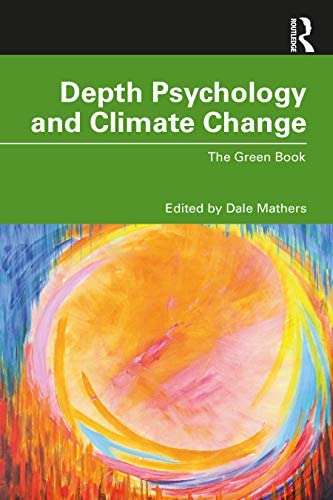‘This is a timely and visionary book, where depth psychology meets deep ecology. The authors explore, explain and expound solutions to the challenge facing our planet. Contributors are analysts who are also artists, poets, philosophers, professors, sailors, scientists, theologians, historians and activists. They illuminate the climate predicament using shamanism, spirituality, synchronicity, science, intuition and imagination.
Everything is connected. The outer climate crisis reflects the inner crisis of the human spirit. Sickness of the earth is reflected in the sickness of the soul. Personal health and planetary health are two dimensions of one single reality. If our civilisation seeks success through consumerism and materialism rather than fulfilment through community coherence and social solidarity then human spirit is bound to be neglected. If mainstream society views the natural world as an economic resource then the oceans become the plastic sink, the forests become commercial commodity and animals are concentrated in factory farms. Climate crisis is a crisis of greed. As Eric Fromm said, we need to move from “having” to “being”. What is the end goal of life? Either we never ask this question or we never have time to find an answer. Faced with climate catastrophe we may be compelled to slowdown and ask this.
This book is a most helpful tool to encourage us to ask such pertinent questions and seek our own answers. As we read we may listen to the small, still, inner voice, which may be a message from our soul and which may also be the message from the universe.’ — Satish Kumar
‘Depth Psychology and Climate Change presents us with a choir of diverse voices, thoughtfully assembled to offer heartfelt and insightful perspectives on our psychological responses to climate change. Highlighting the many ways in which depth psychology can inform – and potentially transform – an uncertain future, the contributors above all illuminate the depth and complexity of our relationship with this beautiful, animate earth.’ — Sharon Blackie, MA, PhD
Depth Psychology and Climate Change offers a sensitive and insightful look at how ideas from depth psychology can move us beyond psychological overwhelm when facing the ecological disaster of climate change and its denial. Integrating ideas from disciplines including anthropology, politics, spirituality, mythology and philosophy, contributors consider how climate change affects psychological well-being and how we can place hope and radical uncertainty alongside rage and despair.
The book explores symbols of transformation, myths and futures; and is structured to encourage regular reflection. Each contributor brings their own perspective – green politics, change and loss, climate change denial, consumerism and our connection to nature – suggesting responses to mental suffering arising from an unstable and uncertain international outlook. They examine how subsequent changes in consciousness can develop.
This book will be essential reading for analytical psychologists, Jungian analysts and psychotherapists, as well as academics and students of Jungian and post-Jungian studies. It will also be of great interest to academics and students of the politics and policy of climate change, anthropology, myth and symbolism and ecopsychology, and to anyone seeking a new perspective on the climate emergency.
Depth Psychology and Climate Change offers a sensitive and insightful look at how ideas from depth psychology can move us beyond psychological overwhelm when facing the ecological disaster of climate change and its denial. Integrating ideas from disciplines including anthropology, politics, spirituality, mythology and philosophy, contributors consider how climate change affects psychological well-being and how we can place hope and radical uncertainty alongside rage and despair.
The book explores symbols of transformation, myths and futures; and is structured to encourage regular reflection. Each contributor brings their own perspective – green politics, change and loss, climate change denial, consumerism and our connection to nature – suggesting responses to mental suffering arising from an unstable and uncertain international outlook. They examine how subsequent changes in consciousness can develop.
This book will be essential reading for analytical psychologists, Jungian analysts and psychotherapists, as well as academics and students of Jungian and post-Jungian studies. It will also be of great interest to academics and students of the politics and policy of climate change, anthropology, myth and symbolism and ecopsychology, and to anyone seeking a new perspective on the climate emergency.
Depth Psychology and Climate Change offers a sensitive and insightful look at how ideas from depth psychology can move us beyond psychological overwhelm when facing the ecological disaster of climate change and its denial. Integrating ideas from disciplines including anthropology, politics, spirituality, mythology and philosophy, contributors consider how climate change affects psychological well-being and how we can place hope and radical uncertainty alongside rage and despair.
The book explores symbols of transformation, myths and futures; and is structured to encourage regular reflection. Each contributor brings their own perspective – green politics, change and loss, climate change denial, consumerism and our connection to nature – suggesting responses to mental suffering arising from an unstable and uncertain international outlook. They examine how subsequent changes in consciousness can develop.
This book will be essential reading for analytical psychologists, Jungian analysts and psychotherapists, as well as academics and students of Jungian and post-Jungian studies. It will also be of great interest to academics and students of the politics and policy of climate change, anthropology, myth and symbolism and ecopsychology, and to anyone seeking a new perspective on the climate emergency.
“This is a timely and visionary book, where depth psychology meets deep ecology. The authors explore, explain and expound solutions to the challenge facing our planet. Contributors are analysts who are also artists, poets, philosophers, professors, sailors, scientists, theologians, historians and activists. They illuminate the climate predicament using shamanism, spirituality, synchronicity, science, intuition and imagination.
Everything is connected. The outer climate crisis reflects the inner crisis of the human spirit. Sickness of the earth is reflected in the sickness of the soul. Personal health and planetary health are two dimensions of one single reality. If our civilisation seeks success through consumerism and materialism rather than fulfilment through community coherence and social solidarity then human spirit is bound to be neglected. If mainstream society views the natural world as an economic resource then the oceans become the plastic sink, the forests become commercial commodity and animals are concentrated in factory farms. Climate crisis is a crisis of greed. As Eric Fromm said, we need to move from ‘having’ to ‘being’. What is the end goal of life? Either we never ask this question or we never have time to find an answer. Faced with climate catastrophe we may be compelled to slowdown and ask this.
This book is a most helpful tool to encourage us to ask such pertinent questions and seek our own answers. As we read we may listen to the small, still, inner voice, which may be a message from our soul and which may also be the message from the universe.” ― Satish Kumar
“Depth Psychology and Climate Change presents us with a choir of diverse voices, thoughtfully assembled to offer heartfelt and insightful perspectives on our psychological responses to climate change. Highlighting the many ways in which depth psychology can inform – and potentially transform – an uncertain future, the contributors above all illuminate the depth and complexity of our relationship with this beautiful, animate earth.” ― Sharon Blackie, MA, PhD
‘This is a timely and visionary book, where depth psychology meets deep ecology. The authors explore, explain and expound solutions to the challenge facing our planet. Contributors are analysts who are also artists, poets, philosophers, professors, sailors, scientists, theologians, historians and activists. They illuminate the climate predicament using shamanism, spirituality, synchronicity, science, intuition and imagination.
Everything is connected. The outer climate crisis reflects the inner crisis of the human spirit. Sickness of the earth is reflected in the sickness of the soul. Personal health and planetary health are two dimensions of one single reality. If our civilisation seeks success through consumerism and materialism rather than fulfilment through community coherence and social solidarity then human spirit is bound to be neglected. If mainstream society views the natural world as an economic resource then the oceans become the plastic sink, the forests become commercial commodity and animals are concentrated in factory farms. Climate crisis is a crisis of greed. As Eric Fromm said, we need to move from “having” to “being”. What is the end goal of life? Either we never ask this question or we never have time to find an answer. Faced with climate catastrophe we may be compelled to slowdown and ask this.
This book is a most helpful tool to encourage us to ask such pertinent questions and seek our own answers. As we read we may listen to the small, still, inner voice, which may be a message from our soul and which may also be the message from the universe.’ ― Satish Kumar
‘Depth Psychology and Climate Change presents us with a choir of diverse voices, thoughtfully assembled to offer heartfelt and insightful perspectives on our psychological responses to climate change. Highlighting the many ways in which depth psychology can inform – and potentially transform – an uncertain future, the contributors above all illuminate the depth and complexity of our relationship with this beautiful, animate earth.’ ― Sharon Blackie, MA, PhD



